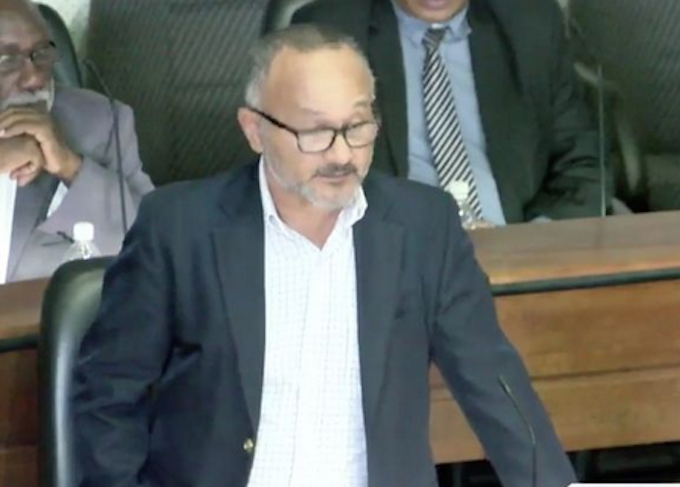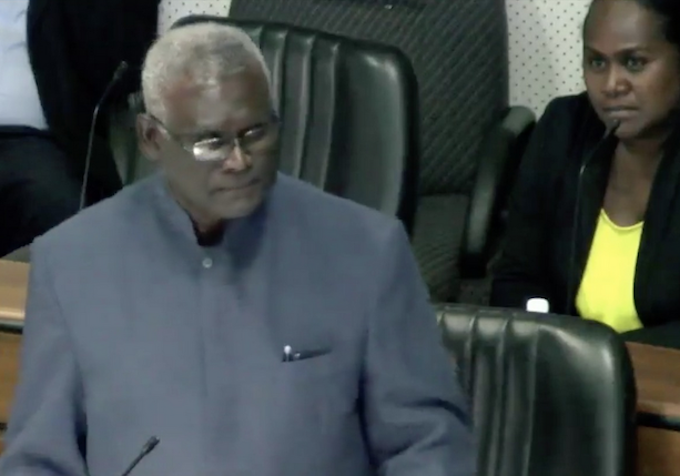By Robert Iroga in Honiara
After a day of political showdown that at times involved shouting battles and personal clashes, the much anticipated motion of no confidence against Prime Minister Manasseh Sogavare was defeated by 32 votes to 15 with two abstentions.
With the capital city Honiara virtually closed for business yesterday, attention turned to Vavaya Ridge where Parliament was debating the motion.
The motion came on the back of social unrest that saw the looting and burning of some 56 buildings across the city and the re-engagement of foreign forces in Honiara to arrest the situation two weeks ago and restore law and order.
- READ MORE: Solomon Islands PM survives no-confidence vote after unrest
- Other Solomon Islands crisis reports
In moving the motion, opposition leader Matthew Wale admitted that he had been conflicted by the need for this motion at this hour in “our history”.
“On the one hand we are dealing with it today because there is need for a political solution to the causes of the tragic events of two weeks ago,” he said.
“On the other, I am conscious that what we say in ventilating this motion may further add to what are already high levels of anger in certain quarters of our society.”
Wale said that as a result of the tragic events that caused so much loss and destruction and even cost lives he had called on the Prime Minister to resign.
‘Eruption of anger’
“I did not make that call out of malice toward him personally. I made that call in recognition of the fact that the tragic events were not isolated events, nor were they purely criminal, but were the eruption of anger based on political issues and decisions for which the PM must bear the primary responsibility,” he said.
“It is democratic for a Prime Minister to be called upon to resign, there is nothing undemocratic about the call. And if he chose to resign that too would be democratic.

“As is the case, the Prime Minister refused to resign, and therefore has necessitated this motion,” he said while moving the motion.
“Although [the people] are resource rich, yet they are cash poor. They have hopes that their children will have access to better opportunities than they did.”
— Opposition leader Matthew Wale
In arguing his case, Wale stated several issues.
On the economy, the MP for Aoke/Langalana said the vast majority of “our people live on the margins of our economy”.
“Although they are resource rich, yet they are cash poor. They have hopes that their children will have access to better opportunities than they did.
“They work hard to afford the high cost of education, though many children leave school because of lack of school fees. Our people are angry that education is so expensive, and that only those that can afford it are able to educate all their kids to a high level of education,” Wale said.
Access to healthcare challenging
“On health, Wale said the vast majority of our people lived where access to healthcare was challenging at best.
He said basic medicines and supplies are often not adequate to meet their health care needs adding that the state of the hospitals are perpetually in crisis management.
The opposition leader pointed out that at the National Referral Hospital Emergency Department patients were sleeping on the floor.
“Why is this the case? Who is responsible? Our people are angry about this,” he asked in Parliament.
Wale also highlighted logging companies disregard of tribal and community concerns, that drive conflict and disputes within tribes and communities. He said the government stood with the logging companies.
He also accused Sogavare of the use of the People’s Republic of China’s National Development Fund (NDF) money to prop up the Prime Minister as another of those issues that was undermining and compromising the sovereignty of the country.
He said the PM was dependent on that money to maintain his political strength.
Chinese funding influence
“How is he then supposed to make decisions that are wholly only in the interests of Solomon Islands untainted or undiluted by considerations for the PRC funds,” he asked.
“You see public anger has been built up over many years by all this bad governance. No serious efforts have been taken to address these serious issues. Provincial governments have increasingly over the past several years repeated their desire that they be given the constitutional mandate to manage their own affairs. Honiara has been consuming almost all the wealth that has been generated from resources exploited from the provinces,” Wale said.
He stated that the provinces had lost trust in Honiara.
“Erratic, poor, mercenary, and politically expedient decision making makes what is already a bad situation worse.
Wale said this was the situation specifically with Malaita.
“Malaita has stood on principle that a PM that lies to the country and Parliament does not have moral authority and legitimacy. Malaita would not accept it.
“Because of that principled position, this PM has not ceased to scheme and plot the consistent and persistent persecution of Malaita.
Malaita sought peaceful protest
“Malaitans have sought to petition the PM, twice, but were ignored and brushed aside in a rather juvenile manner. Malaita asked to stage peaceful protests, but these were denied.
“Malaitans sought an audience with the PM, but they were summarily dismissed. So what are they then supposed to do to get the PM’s attention? The PM consistently refused to visit Auki,” Wale said.

“We never received any formal log of issues from them so that the government sits with them and dialogue over it,” he said.
He stressed that the government runs on rules and protocols on how they deal with each other.
Regarding the motion, Sogavare said it should never be brought to the floor of Parliament.
He accused Wale and his cohorts for driving the interests of a few people.
Willing to face justice
Sogavare said the majority of peace loving Malaitans condemned with utter disgust what had happened.
On corruption allegations, that the foreign forces were helping to protect his government, Sogavare said he was willing to face justice.
“I am very willing and if the leader of opposition can prove the allegations he has against me. This is the easiest way to remove the Prime Minister—that is to send him to jail,” he said.
On the lack of government support in terms of development on Malaita, Sogavare argued that despite the current economic environment his government had performed very well.
In that regard, he said the government did not fail the people of the country, including Malaita province, in the implementation of the twin objective of his government’s policy re-direction.
He said that the government had done so much for Malaita — as a matter of fact more than what some provinces that contributed so much to the country’s economy were getting.
Eight MPs including the PM spoke on the motion.
Robert Iroga is editor of SBM Online. Republished with permission.
This post was originally published on Asia Pacific Report.